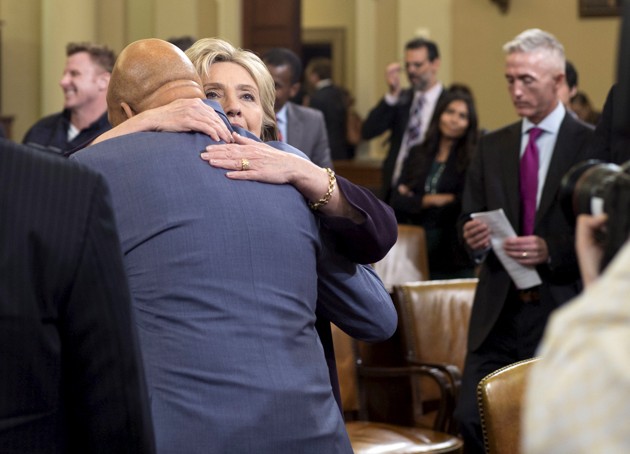
On Friday I argued that the Hillary Clinton email “scandal” was a more-smoke-than-fire phony scandal, this era’s Whitewater. On Saturday, a reader in the national-security world explained why he disagreed. Now, followup reactions from other people who have, or have had, security clearances.
The insanity of today’s classification rules. A reader who has long had clearances for work in several branches of the government writes:
Here’s a bit of context that may be useful:
-- Holders of security clearances are repeatedly reminded that they face severe penalties if they relay classified information even if this information is not marked as such, or has been published in the newspaper. Such penalties range from loss of clearance (which results in loss of employment) to prosecution. That shouldn’t be the case for anyone: Not for secretaries of state, but also not for working-level security officials who face such a threat every day.
-- The drone program is a perfect example of the over-classification lamented (rightly) by Hillary Clinton: During the Bush Administration, I was offered the chance to be “read into” the drone program (that is, to be granted one of the special-access clearances that would have enabled me to read the intel that my TS/SCI [top secret / sensitive compartmented information] clearance did not).
I turned it down, specifically because taking this clearance would have prevented me from ever discussing the drone program with any of my colleagues (all of whom also had TS/SCI), even through the program was being widely reported in the press on a daily basis. It theoretically might even have prevented me from discussing the drone program with my boss—which demonstrates the absurdity of it (i.e., I’m granted an SAP [special access program] clearance specifically to help my boss make policy—but may not be able to brief him on what I've learned).
***
The hypocritical partisan nature of the “investigation” murks it up hopelessly. Mike Lofgren, longtime Congressional staffer and author, most recently, of The Deep State, writes:
As one who had a government clearance during my career, I believe the Hillary case is not at all straightforward. How serious is it? We simply don’t know, and politicians or pundits who claim to know all the facts are just making them up.
On the one hand, having classified info sitting for years on her server in Chappaqua is damning: the Russians, the Chinese, or Joe the Hacker could have accessed them. On the other, the idea of retroactive classification is Kafkaesque, and the media have not really picked up on the ominous implications of that policy (ominous for independent media that rely on leaks to inform the public what their government is doing).
Retroactive classification goes against every canon of Anglo-Saxon law and our own Constitution in prohibiting ex-post facto crimes. Retroactive classification was instrumental in the serious miscarriage of justice against ex-NSA employee Thomas Drake, to cite but one instance.
The matter is even more hopelessly entangled by crass political partisanship. Obviously, Republicans want to boil Hillary in oil over the classified emails. If the emails were properly classified at the time they were originated, I’d say, fine, go get her. But of course, these are the same Republicans who publicly pressured the Army not to administratively punish David Petraeus for handing code-word level classified information to his mistress (who was a journalist and who might reasonably have been assumed to be intent on publishing them) while he was director of the CIA.
Did Senator McCain, using his power as chairman of the Armed Services Committee, by loudly decrying the Army’s proceeding, in effect tamper with an Army investigation to get his buddy off the hook for something equivalent to what he’d want to draw and quarter Hillary for?
The entire issue has not only been hopelessly tainted by partisanship, it is even worse than that: government classification of its own proceedings has gotten so far out of control that it is a danger to a free society.
***
This is taking a toll. From one more reader, who I don’t think comes from the classified-intel world:
I think your reader makes a perfectly fair point. But there are a couple of deeper issues.
First, all of this is having a real impact on the American presidential electoral process. Sure, if one of the candidates is a felon, that's important to know. But this is hazy, hard to quantify historical data handling stuff, and there's just no reason to put it aside for the duration of the campaign. Sitting politicians should not be able to use this kind of innuendo and debate to affect the outcome of the campaign.
Secondly—and maybe I'm just overly cynical—every since President Ford pardoned Nixon, there's been a pretty clear unwritten rule that there are certain kinds of crimes that are simply not to be prosecuted by follow-on administrations. There is no doubt that very well-known incidents in prosecuting the Afghanistan and Iraq invasions in the aftermath of 9/11, from war crimes to massive financial malfeasance could have—and should have—been prosecuted. But I think Presidents very quickly come to recognize that way lies madness, and nobody wants to start down the slippery slope.